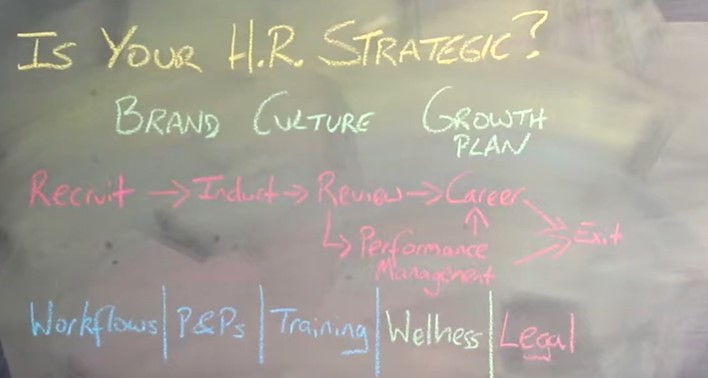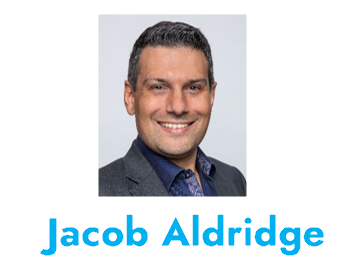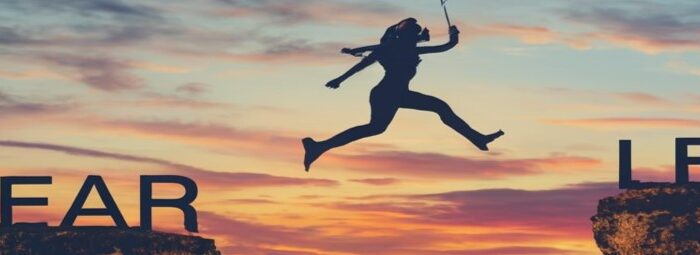Is Your HR Strategic? In Blackboard Fridays Episode 74, Jacob talks about Operational Structure, Culture, Learning and Development, Growth Planning, and Leadership. Need this implemented into your business? Talk to the international business advisor who can do exactly that – Contact Jacob, Learn More, or Subscribe for Updates.
Ah, Human Resources. Are there any business functions murkier (and more feared) than time spent with your HR officer?
Well misunderstand no more! In this week’s Blackboard Fridays episode, allow me to walk you through the 3 levels of great HR:
- The operational essentials, which most businesses do although often not well;
- The strategic layer where great HR staff and providers will deliver you the most value; and
- The value-adds, optional parts of your business that mediocre teams don’t even know exist.
Much like accounting and marketing, you can choose to treat HR as “Compliance” – a necessary evil in your business, and part of the Red administrative burden you must endure.
OR you can embrace the Green growth potential of HR, People and Culture. This is where your best HR resources will want to play, and it’s the only solution good HR consultancies (we know a few, if you need an introduction) will suggest.
Struggle with HR? Watch this week’s episode here and discover the other levels you need, to shift from feared to embraced.
Who is Jacob Aldridge, Business Coach?
“The smart and quirky advisor who gets sh!t done in business.”
Since April 2006, I’ve been an international business advisor providing bespoke solutions for privately-owned businesses with 12-96 employees.
At this stage you have proven your business model, but you’re struggling to turn aspirations into day-to-day reality. You are still responsible for all 28 areas of your business, but you don’t have the time or budget to hire 28 different experts.
You need 1 person you can trust who can show you how everything in your business is connected, and which areas to prioritise first.
That’s me.
Learn more here. Or Let’s chat.
Transcript
The most important function in your business is HR. And yet so many SMEs – despite talking about how their people are their greatest asset – failed to make this function flow.
In my experience, having implemented many end-to-end projects on this topic and helped hundreds of businesses with key components, the failure often flows from confusing the many different elements of an HR function and (as your business grows) of a HR role.
This week, in Blackboard Fridays, we’re going to talk about a whole lot of these different areas to help you understand the things you need to be doing in HR and some of the options you have to turn your HR from an administrative function that costs a business money to a strategic function that actually demonstrates your investment in your people, those people did you value so much.
HR Level 1: The Operational Essentials
We start here at the central line of this framework.

Recruit >> Induct >> Review >> Career >> Performance Management >> Exit
We can see to a degree the career progression of your team – though not all will need Performance Management, and hopefully very few will Exit.
In much larger businesses than yours, each of these different steps within that will be covered by a separate person – perhaps even their own team.
In a micro business (<12 employees when the business owner is the person responsible for all of HR) it’s important you find some time each year to perform and improve those specific tasks. I’ve discussed some of these elements in other episodes, and you might enjoy this Case Study from 2023 where I talked about a project to automate and implement many changes for Recruitment and Onboarding.
- Episode 99, Get Smart: Recruiting Without Recruiters – https://jacobaldridge.com/business/get-smart-recruiting-without-recruiters/
- Episode 32, How to Conduct a Training Needs Analysis for your Team – https://jacobaldridge.com/business/how-to-conduct-a-training-needs-analysis-for-your-team/
- Episode 9, R ‘n’ R – Roles and Responsibilities Part 3 – https://jacobaldridge.com/business/r-n-r-roles-and-responsibilities-part-3/
- Episode 70, How to Progress the Careers of your Team – https://jacobaldridge.com/business/a-career-progression-plan-for-your-best-employees/
HR Level 2: The Strategic Layer
Now, as your business has grown, you have the opportunity to build different elements. You can move beyond operational essentials, and whether it’s part of all of an individual’s responsibilities, embed a HR person with some strategic power.
Brand ++ Culture ++ Growth Plan
At a strategic level the best HR people are working with you on things like Brand, Culture, and your Strategic Growth Plan. Yet remarkably, I see a lot of businesses who have an HR person or an office manager with HR responsibilities and they’re not involving them in some of these key decisions.
How can you plan to grow in your business, which almost always involves from recruiting at some point, if you don’t involve the HR person who’s responsible for bringing those people on board?
How can you build a culture and a brand to the external market if you’re not involving your HR person in making sure that they’re recruiting the ideal team member for your business? And that they’re inducting them into the brand so that as that team member performs, they’re spreading the brand and living the culture of your business?!
HR Level 3: The Value Adds
Strategic HR also involves taking responsibility (not necessarily doing) for a range of different tasks across a business – that add enormous value to your business bottom line, and indeed the equity that you’re building in the business.
You can see why I call this layer “The Value Adds” – they’re not just ‘nice to have’, they add
- The Workflow Processes. Who is doing what tasks in what order, and are they as efficient as they can be?
- The Policies and Procedures. Are the manuals we’ve built for our team clear? Are our team working on continually improving them?
- Training is (amazingly to me) a function that a lot of businesses keep separate. You have a training person and a HR person and the two don’t talk to each other! Your HR person needs to know the Training plan and system. They need to be involved because they’re the ones who are going to be saying, “The team need these skills.”
- Wellness is not a buzzword anymore. It’s now critical if you want to develop your team (and indeed if you want to attract great candidates) that your business embrace a wellness strategy to help them to live the balanced and healthy life they want. And frankly, if your team are healthier, more mindful, more present, more engaged, and have more energy, that can only mean great things for your business. Strategic HR takes that into consideration.
- The last element is Legal. Now, this covers everything from employment contracts to Workplace Health and Safety. Depending on the size and scope of the organization that you run and the industry that you’re in, there may be many other aspects. If you’re large enough to have a separate legal team / somebody with legal responsibilities, it’s critical that your HR person has a relationship with them. Your HR person is going to be involved in so many aspects of each and every one of your team members that if they aren’t clear on the legal obligations of your team members, chances are your team are either not going to be clear or aren’t going to take it seriously.
So Do I need a HR Person, an Agency, of Can I DIY?
Having a full-time, capable, strategic HR person who just manages this is useful. The larger you can grow while having one person who has overall responsibility for that career progression, the more efficient and productive that entire process is going to be.
As a generalisation, I’ve usually seen business owners hand over many of the Operational HR tasks to an employee at around 7-8 full time staff, where those responsibilities (like sending employment contracts) are a small part of an overall position description. It’s often only once a business moves past 30 employees that decisions need to be made – “do we hire a General Manager, a Marketing Manager, or a HR Officer next?”
And there’s no right answer or best solution. If you want to grow your business strategically, then you need to empower either your HR team or your own HR skills. That can be bringing in a coaching team to help your existing team develop improvements. It can be working ongoing with a HR consultancy, to leverage their knowledge but with enough time and attention that it supports your culture. And it can be leaning on outsourced support and, increasingly, SaaS applications that can automate the administrative gruntwork to shift more HR time from Red to Green.
Most importantly of all, HR is not just about each individual’s career progression. You need to integrate Human Resources into your brand, culture, and growth plan; and ensure that these different elements of your business are documented, are communicated and are running efficiently.
Next Steps
Want to learn more about how this can apply to your business? It costs nothing to chat:
- Email me jacob@jacobaldridge.com (I read them all)
- Call, Text, or WhatsApp me +61 427 151 181
- Or just Subscribe https://jacobaldridge.com/about/subscribe-to-jacob-aldridge-com/ to stay in touch





[…] Episode 74, Is your HR Strategic? – https://jacobaldridge.com/business/is-your-hr-strategic/ […]